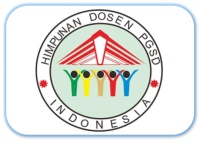PENINGKATAN HASIL BELAJAR SISWA PADA PEMBELAJARAN PKn DENGAN MENGGUNAKAN MODEL THINK PAIR SHARE DI SEKOLAH DASAR
Abstract
The purpose of the study was to describe an increase in student learning outcomes in Civics learning using the Think Pair Share model in class V SDN 19 Sungai tanang. This type of research is PTK, using qualitative and quantitative approaches. The research was conducted in two cycles. Research procedures include planning, implementation, observation, and reflection. The study consisted of two cycles with the research instrument observation sheet and test sheet. The subjects of the teacher and student research were 22 students including 13 male students and 9 female students. The results showed an increase in: (a) RPP I cycle 73.21% (C), cycle II 92.85% (SB), (b) Implementation of aspects of teacher cycle I 82.13% (B), cycle II 96 , 42% (SB) and the results of observation of the first cycle of aspects of students 80.35% (C), second cycle 96.42% (SB), (c) Student learning outcomes cycle I value 72 (C), cycle II 88.40 (SB). It was concluded that the Think Pair Share model can improve PKn learning outcomes of fifth grade students of SDN 19 Sungai Tanang. Keywords:Learning Outcomes; Civic education; Think Pair Share Model
References
Depdiknas. 2006. Kurikulum Tingkat Satuan Pendidikan. Jakarta: Badan Standar Nasional Pendidikan
Kunandar. 2008. Langkah Mundah Penelitian Tindakan Kelas Sebagai Pengembangan Profesi Guru. Jakarta: PT Rajarafindo Persada.
Purwanto. 2013. Evaluasi Hasil Belajar. Yogyakarta: Pustaka Pelajar
Rahmatina & Zuraida. 2017. Pembelajaran Pendidikan Kewarganegaraan dengan Menggunakan Model PBL di SD. E-jurnal Inovasi Pembelajaran SD/ http;//ejournal.unp.ac.id.
Riyanto, Yatim.2009. Paradigma Baru Pembelajaran. Jakarta: Prenada Media Group.
DOI: http://dx.doi.org/10.24036/e-jipsd.v6i2.4396


